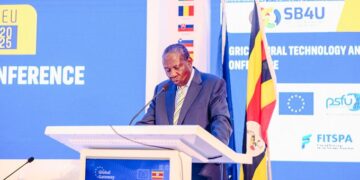Kampala – The Uganda-EU Business Insights 2025 (#UEUBI2025) conference took centre stage at Mestil Hotel, bringing together key stakeholders to explore opportunities in agricultural technology and sustainable mining.
The event builds on the successes of previous Uganda-EU business engagements, with a focus on fostering economic growth through strategic partnerships.

Uganda’s Minister of Finance, Planning, and Economic Development, Matia Kasaija, underscored the importance of Uganda-EU economic collaboration, noting the significant growth in Uganda’s exports to the EU since the inaugural Uganda-EU Business Forum in 2020.
He stressed that Uganda’s economic transformation relies on value chain development, value addition, and access to global export markets.

“Uganda possesses approximately 12 million tons of mineral reserves, vast pine and mahogany forests, and substantial deposits yet to be fully explored and commercialized. By developing value chains and enhancing market access, we can unlock Uganda’s full economic potential, create jobs, and attract investment,” Kasaija said.
Jan Sadek, the European Union Ambassador to Uganda, emphasised the transformative potential of Uganda-EU collaboration, calling for bold and innovative approaches to drive sustainable growth.

He highlighted the impact of last year’s Uganda-EU Business Forum, which facilitated over 1,600 business connections and generated more than €1 million in trial orders.
“The success of the 2024 Forum demonstrated the immense potential of EU-Uganda trade relations. This year, we must build on these achievements by addressing challenges such as climate change, limited access to finance, and shifting geopolitical interests. Strategic solutions and adherence to international environmental and human rights standards are essential for sustainable economic growth,” Sadek stated.

The Minister of State for Energy and Mineral Development, Phiona Nyamutoro, highlighted the conference’s role in convening stakeholders to explore advancements in agricultural technology and sustainable mining.

She reiterated that value addition remains a key priority for Uganda, as it drives job creation, industrialization, and the growth of local content.
“All stakeholders must actively participate in initiatives like #UEUBI2025 to sustain the momentum toward industrialization and economic expansion. Through collaboration, we can achieve long-term success and position Uganda as a competitive player in the global economy,” Nyamutoro concluded.

The Uganda-EU Business Insights 2025 conference marks another milestone in the strengthening of Uganda-EU trade relations, setting the stage for further investment and economic transformation in key sectors.









